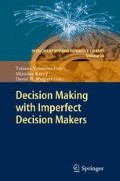Abstract
Bayesian decision theory provides a strong theoretical basis for a single-participant decision making under uncertainty, that can be extended to multiple-participant decision making. However, this theory (similarly as others) assumes unlimited abilities of a participant to probabilistically model the participant’s environment and to optimise its decision-making strategy. The proposed methodology solves knowledge and preference elicitation, as well as sharing of individual, possibly fragmental, knowledge and preferences among imperfect participants. The approach helps to overcome the non-realistic assumption on participants’ unlimited abilities.
Access this chapter
Tax calculation will be finalised at checkout
Purchases are for personal use only
Preview
Unable to display preview. Download preview PDF.
References
Athans, M.: The role and use of the stochastic linear-quadratic-Gaussian problem in control system design. IEEE Transactions on Automatic Control 16(6), 529–552 (1971)
Bernardo, J.M.: Expected information as expected utility. The Annals of Statistics 7(3), 686–690 (1979)
Bernstein, D., Amato, C., Hansen, E., Zilberstein, S.: Policy iteration for decentralized control of Markov decision processes. J. of Artificial Intelligence Research 34, 89–132 (2009)
Bertsekas, D.: Dynamic Programming and Optimal Control, 2nd edn. Athena Scientific, Nashua (2001)
Chajewska, U., Koller, D., Parr, R.: Making rational decisions using adaptive utility elicitation. In: Proc. of the Seventeenth National Conference on Artificial Intelligence, pp. 363–369 (2000)
Cooke, N.: Varieties of knowledge elicitation techniques. Int. J. of Human-Computer Studies 41, 801–849 (1994)
Fishburn, P.: Utility Theory for Decision Making. J. Wiley, New York (1970)
Genest, C., Zidek, J.: Combining probability distributions: A critique and annotated bibliography. Statistical Science 1(1), 114–148 (1986)
Guy, T.V., Kárný, M.: Stationary fully probabilistic control design. In: Filipe, J., Cetto, J.A., Ferrier, J.L. (eds.) Proc. of the Second Int. Conference on Informatics in Control, Automation and Robotics, pp. 109–112. INSTICC, Barcelona (2005)
Harsanyi, J.: Games with incomplete information played by Bayesian players, I–III. Management Science 50(12) (2004) (supplement)
Kárný, M.: Towards fully probabilistic control design. Automatica 32(12), 1719–1722 (1996)
Kárný, M.: Bayesian paradigm and fully probabilistic design. In: Preprints of the 17th IFAC World Congress. IFAC (2008)
Kárný, M., Böhm, J., Guy, T.V., Jirsa, L., Nagy, I., Nedoma, P., Tesař, L.: Optimized Bayesian Dynamic Advising: Theory and Algorithms. Springer, London (2006)
Kárný, M., Guy, T.: Preference elicitation in fully probabilistic design of decision strategies. In: Proc. of the 49th IEEE Conference on Decision and Control. IEEE, Los Alamitos (2010)
Kárný, M., Guy, T.V.: Fully probabilistic control design. Systems & Control Letters 55(4), 259–265 (2006)
Kárný, M., Guy, T.V., Bodini, A., Ruggeri, F.: Cooperation via sharing of probabilistic information. Int. J. of Computational Intelligence Studies, 139–162 (2009)
Kárný, M., Kroupa, T.: Axiomatisation of fully probabilistic design. Information Sciences (2010) (under revision)
Kuhn, H., Tucker, A.: Nonlinear programming. In: Proc. of 2nd Berkeley Symposium, pp. 481–492. University of California Press, Berkeley (1951)
Kullback, S., Leibler, R.: On information and sufficiency. Annals of Mathematical Statistics 22, 79–87 (1951)
Lee, C., Budhiraja, A., Chen, L.: A survey of numerical methods for nonlinear filtering problems. Physica D: Nonlinear Phenomena 230, 27–36 (2007)
Meditch, J.: Stochastic Optimal Linear Estimation and Control. Mc. Graw Hill, New York (1969)
Peterka, V.: Bayesian system identification. In: Eykhoff, P. (ed.) Trends and Progress in System Identification, pp. 239–304. Pergamon Press, Oxford (1981)
Savage, L.: Foundations of Statistics. Wiley, New York (1954)
Schneeweiss, C.: Distributed Decision Making. Springer, Heidelberg (2003)
Sečkárová, V.: Supra-Bayesian approach to merging of incomplete and incompatible data. In: Guy, T., Karny, M., Wolpert, D. (eds.) Decision Making with Multiple Imperfect Decision Makers. UTIA (2010)
Shore, J., Johnson, R.: Axiomatic derivation of the principle of maximum entropy and the principle of minimum cross-entropy. IEEE Transactions on Information Theory 26(1), 26–37 (1980)
Si, J., Barto, A., Powell, W., Wunsch, D. (eds.): Handbook of Learning and Approximate Dynamic Programming. Wiley-IEEE Press, Danvers (2004)
Su, X., Khoshgoftaar, T.: A survey of collaborative filtering techniques. In: Advances in Artificial Intelligence, pp. 27–36 (2007)
Vladimirov, V.: Generalized Functions in Mathematical Physics. Mir Publishers, Moscow (1979)
Šindelář, J., Vajda, I., Kárný, M.: Stochastic control optimal in the Kullback sense. Kybernetika 44(1), 53–60 (2008)
Wolpert, D., Kulkarni, N.: From wireless networks to sensor networks and onward to networked embedded control. In: Proc. 2008 NASA/ESA Conference on Adaptive Hardware and Systems, NASA (2008)
Author information
Authors and Affiliations
Editor information
Editors and Affiliations
Rights and permissions
Copyright information
© 2012 Springer-Verlag Berlin Heidelberg
About this chapter
Cite this chapter
Kárný, M., Guy, T.V. (2012). On Support of Imperfect Bayesian Participants. In: Guy, T.V., Kárný, M., Wolpert, D.H. (eds) Decision Making with Imperfect Decision Makers. Intelligent Systems Reference Library, vol 28. Springer, Berlin, Heidelberg. https://doi.org/10.1007/978-3-642-24647-0_2
Download citation
DOI: https://doi.org/10.1007/978-3-642-24647-0_2
Publisher Name: Springer, Berlin, Heidelberg
Print ISBN: 978-3-642-24646-3
Online ISBN: 978-3-642-24647-0
eBook Packages: EngineeringEngineering (R0)

